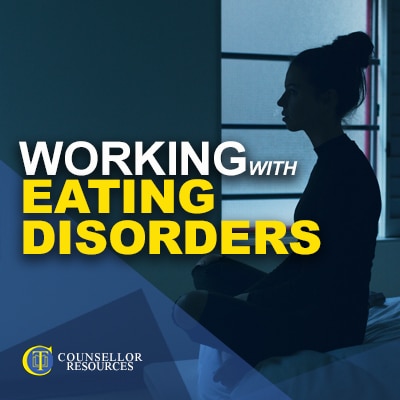In this lecture, you will gain from counsellor, supervisor and trainer Bernie Wright an understanding of how to work with eating disorders. This is a specialist area that requires more training to work competently in; this lecture provides a guide map to the required knowledge, enabling you to plan your next steps if you would like to enter this specialism – for which there is huge demand from clients.

Watch this Lecture + Access Hundreds of Hours of CPD
Certified CPD for Qualified Counsellors
- Hundreds of hours of on-demand CPD lectures to help you stay current with your CPD ethical requirements
- Support, and be supported, by thousands of other counsellors as a member of the exclusive online community.
- Access your learning anytime you want ... anywhere you choose ... using any device type — desktop or mobile.

Bernie begins by presenting statistics and other facts describing how disordered eating is very much the Western norm, and the role of social media in this. You will be given four questions that you can ask clients in order to identify whether their eating is disordered.
Bernie seeks to get underneath disordered eating, looking at its purpose for each individual, and how it can be replaced with alternative strategies that will enable the person to be healthier and happier. She describes the role of a desire for control in eating disorders – and the opposite reality of the situation, in which people become seduced and imprisoned by their eating disorder.
You will learn how to identify and work with the third party in the room – the client’s internal voice – and about a range of eating disorders, including:
- compulsive or binge eating disorder
- bulimia nervosa
- anorexia nervosa
- other specified feeding or eating disorders
- orthorexia
- diabulimia
- night eating syndrome
- feeding disorders.
Bernie speaks too about comorbidities in this field – including body dysmorphic disorder and compulsive physical activity – and the role of autism.
You will learn how to use a client’s body mass index (BMI) to help inform your decision on whether you can ethically work with them within your competence, and when referral and/or involving other professionals is essential. Last but not least, Bernie describes predisposing, precipitating and perpetuating factors for disordered eating.
You will go away from this lecture with a list of six references for further learning, together with an idea of how you can train to be able to practise in this specialist area where a greater number of competent therapists are undoubtedly required.
About the Lecture Presenter

Bernie Wright is a qualified BACP (Accred) counsellor/ psychotherapist and qualified clinical supervisor with many years' clinical experience working with eating disorders and obesity.
In addition to her private practise, she works as a trainer, a mentor and a supervisor for the National Centre for Eating Disorders.
Bernie is passionate about her work and keen to support both sufferers and those caring for loved ones suffering from eating disorders and indeed to get as many health professionals trained and working in this field.
Free Handout Download
Working with Eating Disorders lecture overview